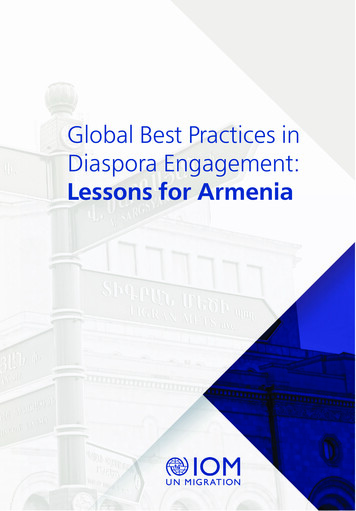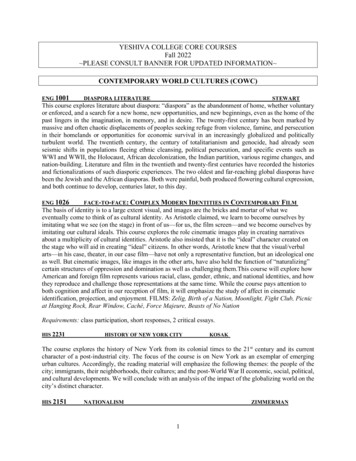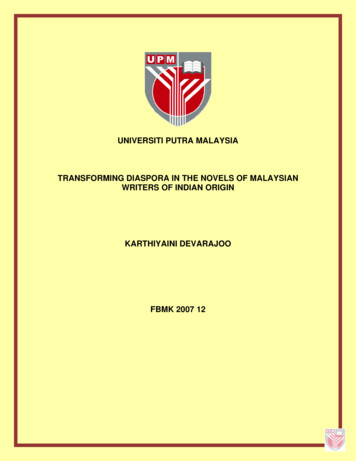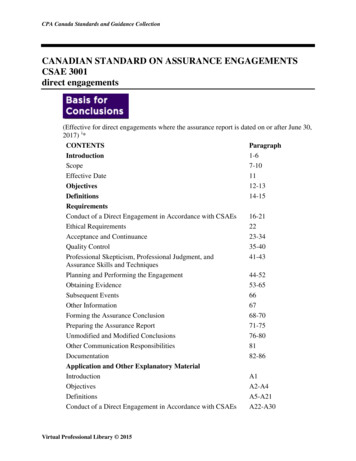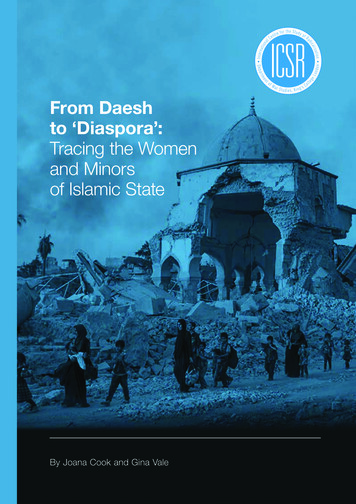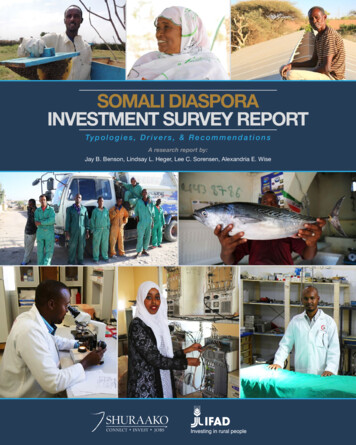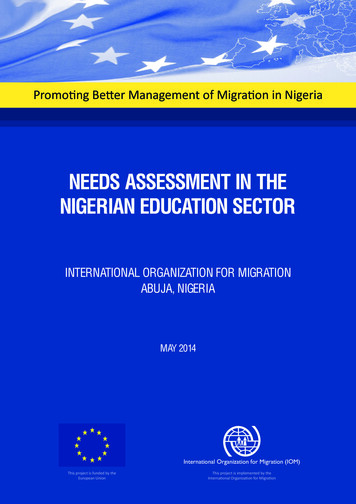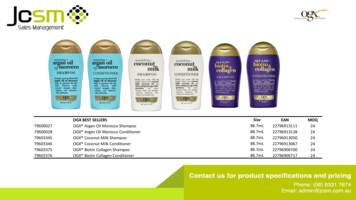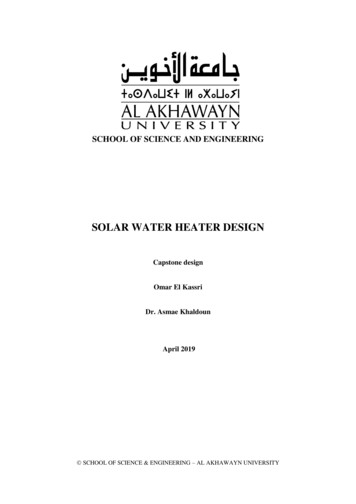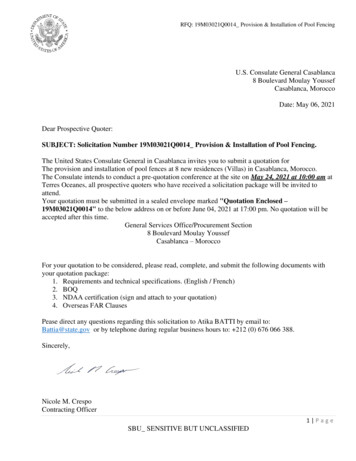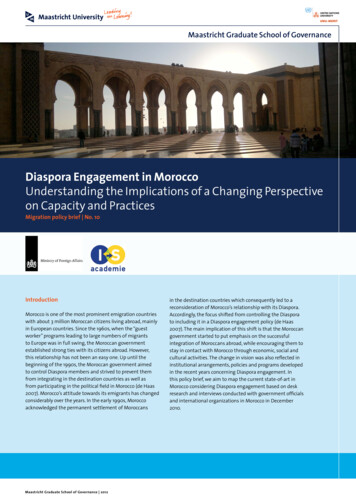
Transcription
Maastricht Graduate School of GovernanceDiaspora Engagement in MoroccoUnderstanding the Implications of a Changing Perspectiveon Capacity and PracticesMigration policy brief No. 10IntroductionMorocco is one of the most prominent emigration countrieswith about 3 million Moroccan citizens living abroad, mainlyin European countries. Since the 1960s, when the “guestworker” programs leading to large numbers of migrantsto Europe was in full swing, the Moroccan governmentestablished strong ties with its citizens abroad. However,this relationship has not been an easy one. Up until thebeginning of the 1990s, the Moroccan government aimedto control Diaspora members and strived to prevent themfrom integrating in the destination countries as well asfrom participating in the political field in Morocco (de Haas2007). Morocco’s attitude towards its emigrants has changedconsiderably over the years. In the early 1990s, Moroccoacknowledged the permanent settlement of MoroccansMaastricht Graduate School of Governance 2012in the destination countries which consequently led to areconsideration of Morocco’s relationship with its Diaspora.Accordingly, the focus shifted from controlling the Diasporato including it in a Diaspora engagement policy (de Haas2007). The main implication of this shift is that the Moroccangovernment started to put emphasis on the successfulintegration of Moroccans abroad, while encouraging them tostay in contact with Morocco through economic, social andcultural activities. The change in vision was also reflected ininstitutional arrangements, policies and programs developedin the recent years concerning Diaspora engagement. Inthis policy brief, we aim to map the current state-of-art inMorocco considering Diaspora engagement based on deskresearch and interviews conducted with government officialsand international organizations in Morocco in December2010.
Maastricht Graduate School of GovernanceMap 1. Map of Morocco (Source: United Nations Cartographic Section, 2008)The Moroccan DiasporaMoroccan emigration evolved at an unprecedented pacestarting from the 1960s. As a result, today Moroccans livingabroad represent around 10% of the total population ofthe country, and constitute the largest and most dispersedAfrican immigrant population in Europe (de Haas 2009).The modern Moroccan emigration history that startedwith the exodus of low-skilled male workers witnesseddiversification over the years due to immigration restrictionsand decreased demand for low-skilled labour. Subsequently,family reunification and formation became the main ways ofmigrating and led to a feminization of emigration, and theincreased emigration of children. Since the 1990’s, emigrationof medium and highly skilled individuals to the United Statesand Canada has also considerably increased. As a result ofthese new trends and the transition from temporary topermanent migration, today a large multifaceted MoroccanDiaspora consisting of professionals from different sectorshas been established.Maastricht Graduate School of Governance 2012Currently, France hosts the largest group of Moroccans, whichaccounts to just over a million migrants (1,046,564) (Khachani2011). As a consequence of the former labour migrationagreements, large Moroccan communities also exist inthe Netherlands (247,587), Belgium (267,614) and Germany(117,552). Spain and Italy have become destination countriesfor Moroccans in recent years, and now host a considerablenumber of Moroccans (Italy 400,432/ Spain 557,000). Asmaller number of often highly qualified Moroccans live inthe US (27,427) and in Canada (44,621). Other Arab countrieshost around 185,413 Moroccans, with 45,109 in Algeria and29,883 in Saudi Arabia. A little more than 8000 Moroccanslive in sub-Saharan African countries and around 767 in Asiaand Oceania (Khachani 2011).
Maastricht Graduate School of GovernanceA Changing Perspective on Diaspora Engagement inMoroccoIn the last a few years Morocco has built its Diasporaengagement strategy based on the idea that Moroccancitizens abroad can and should integrate successfully in theresident countries while maintaining contact with Morocco.This comprehensive perspective is observed to be acceptedby the governmental institutions concerned with Moroccansresiding abroad. We see that the vision of compatibilitybetween host country integration and home country loyaltyhas led to two main streams of objectives and policy making.The first set of policies aim at supporting Moroccans’ wellbeing and integration in economic, social, cultural andpolitical domains in the destination countries, while thesecond set of policies focuses on engaging the Moroccansresiding abroad in economic and social activities orientedtowards Morocco specifically.In 2007, the Ministry of Moroccans Residing Abroad(Ministère des Marocains Résidant à l’Etranger) was (re)founded1 to follow up on this Diaspora engagement strategyand to strengthen the coordination between the keystakeholders such as the Council of the Moroccan CommunityAbroad (Le Conseil de la Communauté Marocaine à l Etranger,CCME), Hassan II Foundation, Directorate of Consular andSocial Affairs (Ministry of Foreign Affairs and Cooperation),Ministry of Labour and Professional Education, RegionalCentre for Investment (Ministry of Interior), Moroccan Councilof Ulemas for Europe and Mohammed V Foundation forSolidarity.1The Ministry of Moroccans Residing Abroad has a history datingback to 1990, however since then the ministry went through severalchanges and disruptions. For more information on the history ofthe ministry, see Belguendouz 2006, Brand 2006.Maastricht Graduate School of Governance 2012Residence country oriented objectives and activities ofinstitutionsThere are two destination country specific priorities forthe Moroccan government since it has recognized thepermanent settlement of Moroccan migrants in thedestination countries. First, the Diaspora’s loyalty to thecountry is aimed to be preserved by the formation of a strongnational identity. In this matter, especially the second- andthird- generation Moroccan migrants occupy an importantsection. Policies focus on preserving a Moroccan identitythrough linguistic, religious and cultural dimensions. Second,Morocco has the objective of restoring the trust of Moroccansresiding abroad towards the Moroccan government, anddefending their interests by promoting their legal, social andhumanitarian situation in the countries of residence. Morespecifically, vulnerable and disadvantaged groups such asunaccompanied children, prisoners and single parents aresupported by legal assistance in cooperation with residentcountry institutions and consular services.
Maastricht Graduate School of GovernanceTable 1. Resident country oriented objectives and activities of institutionsName institution/ Ministry involvedObjectives and ActivitiesMinistry of Moroccans ResidingAbroadDepartment for economic andsocio-cultural activitiesNational identity formation for the descendents of Moroccans residing abroadMigrant Rights Centre(Centre Droits MRE)Dissemination of information regarding migrants’ rights through trainings, conferences and aspecialized library regarding legal documents about migrationCapacity building of non-governmental organisations in the field of migrants’ human rightsCreation and intensification of existing cooperation with international, national, and regionalorganisations dealing with rights of migrantsCouncil of the Moroccan CommunityAbroad(independent advisory institutionwith administrative and financialautonomy founded in 2008)Identification and analysis of problems of Moroccans abroad resulting from emigration - working groups dealing with topics of women’s rights and new generation, citizenship andpolitical participation, culture, education and identity, administration and public policies, cultureand religious education, and scientific, technical and economic competencesDirectorate of Consular and SocialAffairs(Ministry of Foreign Affairs andCooperation)Protection of rights, interests and properties of Moroccans residing abroadOrganisation of cultural eventsHassan II Foundation(financially autonomous, non -profitinstitution founded in 1990)Education, cultural exchange, sport and youthMoroccan Council of Ulemas forEurope(Ministry of Habous and IslamicAffairs)Promotion of dialogue between all religions and beliefs as well as openness to the different culturesof European societiesProvide spiritual support to Muslims and guide the youth against extremism and deviation.Help young people to grasp and assimilate the purposes of IslamRaise awareness of Muslims settled in EU about the values of tolerance, moderation, and peaceadvocated by IslamParticipate in the training and supervision of imams in Europe to learn about the historical and socialspecificities of each countryMonitor its services for full consistency with the laws of the countries of residenceSend preachers (wâiz) and religious guides (mushaffi) during the time of RamadanMaastricht Graduate School of Governance 2012Preservation of moral and material interests of Moroccans residing abroad in MoroccoPromotion and organisation of social, cultural, educational, artistic and recreational activities relatedto the Moroccan DiasporaEg.: Organisation of the National Day of Moroccans AbroadOrganisation of cultural weeks in destination citiesEstablishment of cultural centres in residence countries- Centres were founded as a space for dialogue between Moroccans and partnership betweenregional and local authorities- Currently found in Brussels, Barcelona, Paris, Montreal and TripoliEducational activities relating to the Arabic language, national culture and religious instruction (witha focus on descendents of Moroccan migrants abroad) - Construct, acquire and equip, if necessary, schools, socio-cultural centresOrganise summer camps and travels to Morocco for Moroccan descendants living abroad - Cultural exchange of young descendents of Moroccans abroadLegal and social assistanceProvide financial, medial and/or legal assistance to those who are in need
Maastricht Graduate School of GovernanceMorocco oriented objectives and activities of institutionsMorocco oriented governmental initiatives aim to engagethe Moroccan Diaspora for the country’s economic, socialand human development. First, Moroccans living abroadare encouraged to make investments in Morocco, andconcrete programs (eg. FINCOME program) are launchedin order to mobilize their competences for scientific andprofessional objectives. The government puts emphasisespecially on durable development, new technologies andterritorial development through which Morocco can bebetter integrated with knowledge economy. Another wayof better engaging the Diaspora to achieve developmentin Morocco, according to official statements, is to enhancethe communication between Moroccan associations abroadwith their equivalents in Morocco and local authorities.Through this communication, the government aims tosupport partnerships which can consequently lead to localdevelopment projects.Table 2. Morocco oriented objectives and activities of institutionsName institution/ Ministry involvedObjectives and ActivitiesMinistry of Moroccans ResidingAbroadDepartment for economic andsocio-cultural activitiesMonitor actions which facilitate the definitive return of Moroccans residing abroad- Establishment of “maisons des MRE” to support returnees as well as families of migrants stayingin MoroccoEncourage associational lifeEg.: Capacity building of migrant associations’ organisational skillsPresent project ideas of migrant associations that can contribute to the development of MoroccoMobilization of competences- Establishment of Deutsch-Marokkanisches Kompetenznetzwerk (German-Moroccan network ofcompetences)- FINCOME (Forum International des Compétences Marocaines à l’Etranger) in cooperation withMinistry of EducationInform Moroccans abroad on investment opportunities in MoroccoCouncil of the Moroccan CommunityAbroad (Founded in 2007)Encourage the participation of Moroccans abroad in the political, economic, cultural and socialdevelopment of MoroccoHassan II FoundationLegal and social assistance unitManagement of an internet based “Platform of Services for Moroccans Residing Abroad” (Plateformede Services pour les Marocains Résidant à l’Etranger)Economic development unitMonitor and evaluate the Moroccan economic environment, informing potential investors andreturnees about the economic sectors in Morocco and assisting these with their investment projectsCooperation and partnership unitMohammed V Foundation forSolidarityDevelop cooperation with governments, non-governmental organisations and internationalorganisations specialised in migration issues in Morocco and countries of residence“Opération Transit”: responsibility taken over from Hassan II foundationOperations during the summer holidays and logistical assistance: facilitate traffic and circulation ofMoroccans residing abroad between the port of entry and their final destinationSet up assistance and reception centresThe Moroccan GovernmentMaastricht Graduate School of Governance 2012Support and facilitate the transfer of monetary and in-kind remittances and investment made byMoroccans residing abroad- Establishment of Bank Al-Amal (Micro-credit bank)- Reduction of transfer rates by the establishment of Overseas Bank Offices of “la Banque Populaire”- Free of cost transfers for six months after the economic crisis in 2009- Possibility of having foreign currency bank accounts accessible to Moroccans residing abroad
Maastricht Graduate School of GovernanceIn addition to the concrete objectives and activities for thewell-being of Moroccans residing abroad and mobilizing theirpotential contribution to development, there is an inclinationtowards better understanding emigration and evidencebased policy making in Morocco. The Ministry of MoroccansResiding Abroad, for instance, aims to centralise informationand statistical data on migration. They aim to followmigratory movements and to study the living conditionsof Moroccans abroad. Moreover, the Ministry of MoroccansResiding Abroad and the directorate of Consular and SocialAffairs negotiate and monitor international agreementsregarding Moroccans residing abroad (eg. Labour migrationand social protection). Finally, the Council of the MoroccanCommunity abroad is also responsible for monitoringand evaluating Morocco’s policies related to Moroccansliving abroad and to contribute to the development of anational strategy of global and multidimensional migrationby providing bi-annual recommendations to the King ofMorocco.Discussion and ConclusionIn this policy brief, we mapped how the responsibilities andactivities of various organizations dealing with Moroccansresiding abroad are divided. The main distinction regardingthe objectives that are aimed to be achieved through theseactivities and policy perspectives is made between thesuccessful integration of the Moroccan Diaspora in theresidence countries and their participation in home countryaffairs to contribute to development. Likewise, the minister ofGeneral and Economic Affairs stated in an interview in 2007that according to the new view of the government, Moroccansabroad “are no longer considered simple remittance providersfor the origin country, but real actors of economic and socialdevelopment and economic ambassadors of Morocco in theirreceiving countries” (cited in Belguendouz 2010 in French).The most striking observation one can make regardinginstitutional arrangements is that Diaspora engagementpolicies in Morocco are managed and implemented bynumerous organizations. On the one hand, the multiplicityof organisations shows that a high level of importance isaccorded to emigrant citizens; on the other hand, it revealsthat diaspora engagement is managed in a dispersed way,where specific issues related to emigrants are dealt mainly byexisting institutions that are not always specifically targetedat migrants but intervene when necessary. Moreover, in severalcases there is not only an overlap between the responsibilitiesof organizations, but a shift between the responsibilities oforganizations. For instance, the project facilitating the arrivalof Moroccans residing abroad to Morocco during summer timehas shifted from the Hassan II Foundation to the MohamedV Foundation for Solidarity. On a different note, one exampleMaastricht Graduate School of Governance 2012of different actors involved in the same programme wasthe Moroccan FINCOME. In this case, some parties involvedinvite skilled Moroccans abroad to come back permanentlywhile others suggest staying in the receiving countries tosupport marketing for Moroccan products, thus disposingthe lack of a coherent vision (Belguendouz 2010). In thiscontext, coordination and communication between variousgovernmental and non-governmental organizations dealingwith different subjects related to Diaspora engagementbecomes a major challenge.For the effectiveness of policies, a coherent vision needs tobe established and managed by an institution in constantcommunication with responsible parties involved in theexecution of policies and programs. In that sense, the reestablishment of the Ministry of Moroccans Residing Abroadis of high significance. However, for long-lasting efficientDiaspora engagement policies, the sustainable functioningof this ministry is indispensable. Considering the institutionalhistory of this ministry and how it went through severalchanges, and was closed for some years before being reopenedagain since it was opened for the first time in the late 1990s,one of the main objectives of the Moroccan governmentshould be to provide the necessary conditions for dialogue andcooperation.In relation to this, democratization and political liberalizationin Morocco are of high significance. The country has gonethrough a process of liberalization in the last a few decades,and at least in principle, participatory governance has becomean integral part of the country’s strategy. Nevertheless, theactual practice of participatory governance and the Diaspora’sengagement and democratic representativeness remain to bethe issues that need to be addressed in further detail. Havingobserved a remarkable change in the attitude of the Moroccangovernment towards its citizens residing abroad, it is of greatinterest how new policies and projects are implemented andtheir success is supported in the coming years.
Maastricht Graduate School of GovernanceReferencesAuthorsBelguendouz, Abedlkrim. 2006. Le traitement institutionnel dela relation entre les Marocains résidant à l étranger et le Maroc.CARIM Research Report Analytic 2006/06, Robert SchumanCentre for Advanced Studies, San Domenico di Fiesole (FI):European University Institute.Özge Bilgili, PhD Candidate Maastricht Graduate School ofGovernanceMaastricht UniversityBilgili, Özge and Silja Weyel. 2009. Migration in Morocco:History, Current Trends and Future Prospects. Paper series:Migration and Development Country Profiles. Maastricht:Maastricht Graduate School of Governance.Brand, Laurie A. 2006. Citizens abroad. Emigration and the statein the Middle East and North Africa. Cambridge: CambridgeUniversity Press.Silja Weyel, PhD Candidate Maastricht Graduate School ofGovernanceMaastricht UniversityDe Haas, Hein. 2007. Between courting and controlling: TheMoroccan state and “its” emigrants. Working paper 07-54.Oxford: Centre on Migration, Policy and Society.De Haas, Hein. 2009. Morocco. Country Profile no 16, FocusMigration. Hamburg: Hamburg Institute of InternationalEconomics (HWWI).Khachani, Mohamed. 2011. La question migratoire au Maroc:données récentes. Series CARIM AS, 2011/71, Robert SchumanCentre for Advances Studies, San Domenico di Fiesole (FI):European University Institute.Ministry of Moroccans Residing Abroad. 2009. A guide book forMoroccans Residing Abroad, Rabat, Morocco.Useful internet sourcesMinistry of Moroccans Residing Abroadhttp://www.marocainsdumonde.gov.maMinistry of Habous and Islamic Affairshttp://www.habous.gov.ma/frMinistry of Foreign Affairs and Cooperationhttp://www.diplomatie.maMinistry of Financehttp://www.finances.gov.maFoundation Hassan IIhttp://www.alwatan.maCouncil of the Moroccan Community Abroadhttp://www.ccme.org.ma/frThe photos are taken by Özge Bilgili in 2011 in Rabat andCassablanca.Maastricht Graduate School of Governance 2012
Maastricht Graduate School of Governance Introduction Morocco is one of the most prominent emigration countries with about 3 million Moroccan citizens living abroad, mainly in European countries. Since the 1960s, when the "guest worker" programs leading to large numbers of migrants
